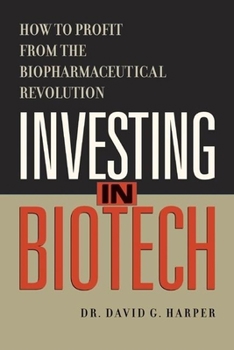Investing in Biotech: How to Profit from the Biopharmaceutical Revolution
Select Format
Select Condition 
Book Overview
Until the 1990s it barely existed, but biotech is now a multi-billion dollar industry producing windfall profits. Everyone is talking about human cloning, the genome project, and cures for cancer and... This description may be from another edition of this product.
Format:Hardcover
Language:English
ISBN:1551924404
ISBN13:9781551924403
Release Date:August 2002
Publisher:Raincoast Books
Length:256 Pages
Weight:1.18 lbs.
Dimensions:1.1" x 6.0" x 9.0"
Customer Reviews
1 rating
Biotech: Science and Investing
Published by Thriftbooks.com User , 21 years ago
David Harper manages a biotechnology investment firm and is a research associate in the Zoology Department at the University of British Columbia. He draws on both his financial and technical expertise in his book Investing in Biotech.The first half of the book presents the science of biotechnology at a level appropriate for the intelligent layperson. He explains the difference between biotech and traditional pharmaceuticals (large molecules often produced by the human body versus small molecules), describes the framework of disease (anatomy, physiology, pathology, and treatment), presents the various approaches to developing biotech drugs (e.g., gene therapy, monoclonal antibodies, antisense), and identifies specific types of disease which biotech products may treat (cardiovascular, neurological, metabolic, transplantation).The second half presents factors to consider and strategies to employ in biotech investing. A biotech company's pipeline of potential future drugs is the most important factor in evaluating its investment potential. However, the value of each individual pipeline drug must be evaluated in terms of its progress through the process of clinical trials leading to approval and each drug must be assigned an appropriate weighting which increases as the drug progresses through these trials. Harper also presents his own formula for determining the value of biotech stocks which I have not seen elsewhere. It uses book value, share price, sales per share, and cash per share to estimate a stock's "financial valuation"; shares outstanding, average daily volume, institutional investment, and volatility (beta) to estimate "liquidity"; and present share price together with the 52-week high and low to represent "scope for growth". These three components are then combined to determine the overall valuation. This approach appears to be heuristic rather than one grounded in classical financial valuation theory (as presented, for example, in Investment Valuation by Aswath Damodaran). Harper's approach may be particularly useful in valuing companies that are not currently profitable but would be more convincing if he provided either an explanation of how the formula was developed or historical data that justifies its use. Harper concludes by applying his formula to evaluate the investment potential of numerous biotech companies as of the date of his writing. He stresses that this evaluation is only valid at that one point in time and will change with the rapidly changing technology and financial status of the companies.Overall, Harper's book was interesting and very helpful in understanding the science of biotech. I would caution against using his approach to allocate a major percentage of any portfolio to biotech stocks (which Harper does not advocate). I don't mind an occasional small bet on a currently unprofitable company but prefer to invest primarily in companies (including some biotechs) with current and growing profits. In addit






